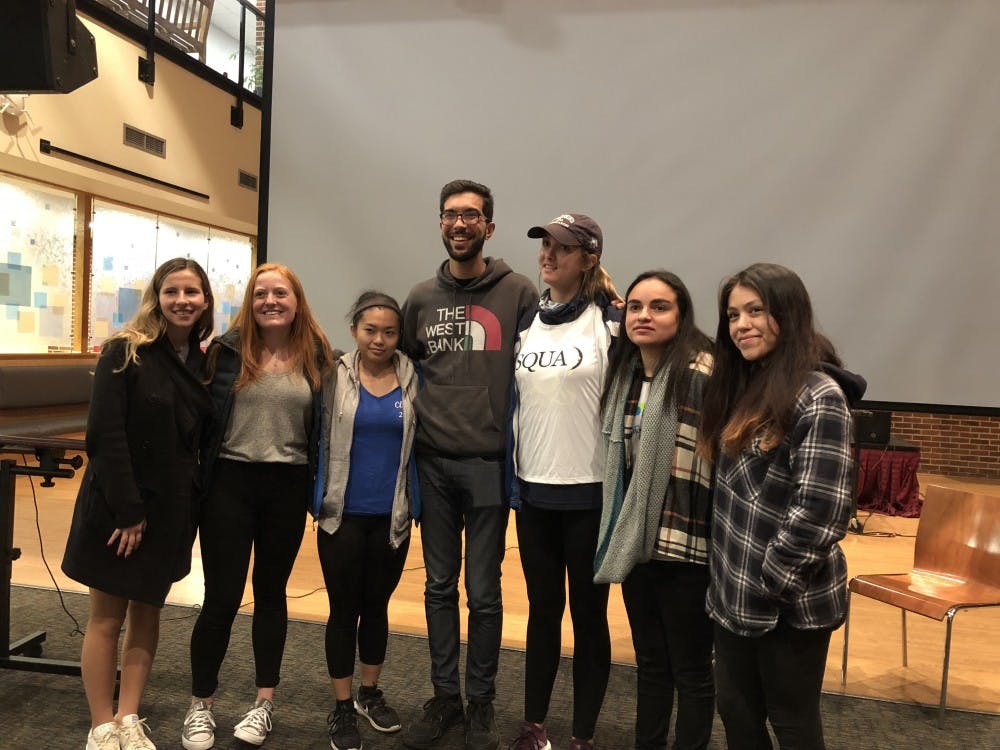If you were on Lebanon’s northern coast sometime earlier this year, you might have seen a man carrying a collapsed, four-wheeled baby stroller. Inside this stroller sat not a child, however, but all of the man's belongings, stuffed in a 25-kilogram backpack. In the man’s other hand was a Palestinian flag.
The man, Benjamin Ladraa, was not invading Lebanon, to the relief of the Lebanese police -- although they spent many hours interrogating him just to be sure.
No, Ladraa was only passing through, in the middle of his journey walking from Sweden to Palestine. Walking was his way of bringing awareness of Palestinian refugees to other Europeans and the world.
Ladraa, 25, is a Swedish human rights activist who spoke at the University of Richmond Monday to the student-led organization No Lost Generation. Ladraa specifically talked about the suppression of Palestinian refugee rights, and how that inspired him to walk through 14 countries for more than 11 months starting in fall 2017. The walk was Ladraa’s effort to start conversations about Palestine.
The journey from Sweden to Palestine was challenging, Ladraa said. At one point while he walked in Germany, it rained for two weeks straight. Everything he owned was soaked with water, Ladraa said. During his speech, Ladraa described the joy he had felt when he came across a bridge during this time.
“I really appreciate roofs now," Ladraa said. "Roofs are great.”
Ladraa slept in a variety of places, oftentimes in abandoned buildings. When he walked through Bulgaria in the middle of a blizzard, he was unable to find a place to stay and slept in the snow, he said.
“I felt that this journey was more of a mental thing, above anything else,” Ladraa said.
When Ladraa reached Palestine, he visited Hebron, the second largest city in the West Bank, he said. Palestinians were under intense military occupation within the city, Ladraa said. Walls were built within the center of streets so that Israelis and Palestinians had to walk on separate sides, he said.
Ladraa showed pictures of caged windows that protected Palestinians from open fire and of doors that have been boarded up by the Israeli military since the military began to occupy the city. Palestinians could exit their homes only by climbing out onto the roof, Ladraa said.
“You can’t really understand the situation that is going on there," Ladraa said. "Barely anyone goes there, and barely anyone lives there. It’s extreme violence.”
Ladraa walked to Palestine to get a better understanding of the Israeli-Palestinian conflict and to advocate for Palestinian refugees, he said. And he wasn’t just walking, he said. He had talked as well.
Enjoy what you're reading?
Signup for our newsletter
“You can’t just pick up the phone and call CNN saying, ‘Hey, I wanna talk Palestine,'" Ladraa said. "I had to do something that within itself will garner attention, because this walk is very difficult. That within itself is a conversation starter of how to talk Palestine.”
Ladraa said that throughout his journey, he had talked to people who had passed him on the street, at colleges and universities and to journalists. Since Ladraa’s walk to Palestine, he has been traveling across the U.S. speaking about his experiences. He said that he had already visited over 20 cities. During this tour, Ladraa is encouraging Americans to learn more about the Palestinian refugee crisis and to participate in human rights activism.
“I think we can talk about starvation in Yemen, but to see starving children is different," Ladraa said. "It is different than being comfortable sitting around a nice, cozy lake hearing me talk.
"You can’t just go to university. You need real-life experience to gain understanding. You need both.”
Ladraa didn’t come to UR to depress students with information about Palestinian refugees, he said. Ladraa said many historic junctures had happened by many people demanding action to take place. He specifically referenced examples when this had occurred in the U.S., such as women’s suffrage and the civil rights movement.
Ladraa said it was important for him to speak with U.S. students.
“You are the most important people on the entire planet to do anything about this situation,” he said.
Caroline Schiavo, the co-president of No Lost Generation, said Ladraa’s presentation had shed light on a perspective that most students don’t hear about. Schiavo also said Ladraa’s mission aligned with No Lost Generation’s: fighting to support aid organizations, advocacy and support for refugees and in-kind support – such as volunteering and curriculum uploading.
Ladraa said we as people didn't know how much potential we had, and how quickly things could change.
“Last November, I spent my birthday in a tent,” Ladraa said. “This November, I spend it traveling America.”
Contact news writer Olivia Diaz at olivia.diaz@richmond.edu.
Support independent student media
You can make a tax-deductible donation by clicking the button below, which takes you to our secure PayPal account. The page is set up to receive contributions in whatever amount you designate. We look forward to using the money we raise to further our mission of providing honest and accurate information to students, faculty, staff, alumni and others in the general public.
Donate Now



